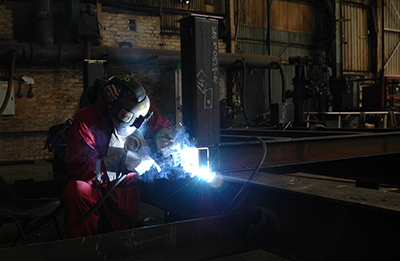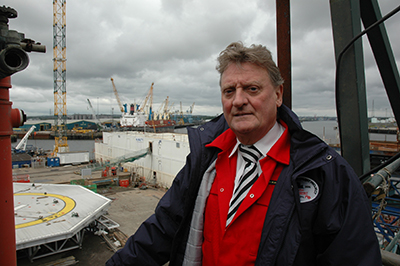Skills' Shortage Threatens Offshore Industry
Nigel is frequently commissioned to write business and industry features for national and regional newspapers, as well as specialist publications, such as Lloyds List. He prides himself on being able to turn complicated and heavy issues into stories that mean something to the general public. This story was carried in a number of publications in 2006.
THE manager of a shipyard has warned he may have to recruit foreign workers because he cannot find enough skilled tradesmen in Britain’s worst unemployment black-spot.
 A welder at McNulty’s offshore yard.
Steve Keyworth is struggling to find welders, pipe-fitters and electricians in South Tyneside, where nearly one in four people are on the dole.
A typical welder on the Tyne earns an annual salary of £25,000 for a 40-hour week, with the opportunity to boost his salary with overtime.
A welder at McNulty’s offshore yard.
Steve Keyworth is struggling to find welders, pipe-fitters and electricians in South Tyneside, where nearly one in four people are on the dole.
A typical welder on the Tyne earns an annual salary of £25,000 for a 40-hour week, with the opportunity to boost his salary with overtime.
Government figures show that, out of 72,000 people of working age in South Tyneside, 16,000 are claiming jobseekers’ allowance or incapacity benefit. Steve, who is Managing Director of McNulty’s in South Shields, blames the problem on a lack of Government investment in training schemes. He has warned that the skills’ shortage could destroy the region’s worldwide reputation for shipbuilding and offshore construction.
Incredibly, even the recent loss of 300 jobs across the river at Swan Hunter’s has not solved the problem. Steve has been able to take on 40 welders and other “black trade” workers from Swan’s. But he claims it is “just a drop in the ocean” in terms of replacing older skilled tradesmen who are retiring and not being replaced.
McNulty’s currently employs around 800 workers who are finishing an order for a 250-man accommodation block for the Kasahagan oil field in the Caspian Sea. Later this month, a massive floating oil production vessel called the Global Producer III will arrive for an upgrade. The contract will see the yard’s workforce rise to 1,000.
Steve said: “South Tyneside is one of Britain’s biggest unemployment black-spots, yet I can’t get trades to man the current projects. The skills’ shortages involve welders, pipe-fitters and electricians. “If this situation continues, it will affect my ability and credibility for future work abroad. “If nothing is done, we will have to resort to the use of foreign labour. From my own personal point of view, I would find that difficult to square if there are unemployed people here in South Tyneside. “But if they have no skills, we have to look at the bigger picture to continue creating wealth for the area.”
McNulty’s have trained more than 100 apprentices in the last nine years.
Steve said: “We have done something ourselves.
 Managing Director Steve Keyworth.
We have always had apprentices but not enough to fill the gap left by the aging workforce.
It takes three years to train a welder.
“We can invest money in qualifying a welder but he can then go and work somewhere else and we lose him. How much money do we invest in training these people ?
“There was a River Tyne initiative in 1997 led by Swan Hunter, ourselves and A and P Tyne.
Managing Director Steve Keyworth.
We have always had apprentices but not enough to fill the gap left by the aging workforce.
It takes three years to train a welder.
“We can invest money in qualifying a welder but he can then go and work somewhere else and we lose him. How much money do we invest in training these people ?
“There was a River Tyne initiative in 1997 led by Swan Hunter, ourselves and A and P Tyne.
It was estimated that the average age of a worker was 49. Now I would say it’s probably 50-plus. “We tried to secure central government funding to head off the current situation but it never materialised. “You have very few younger people coming into the industry. The situation is now a crisis because once these people do leave the industry, we will lose one of the major creators of wealth for the region.”
Steve told how he has also got hold of Government figures which show that the amount the British oil industry pays in taxes has risen from £3 billion in 2000 to £15 billion a year now. “The Government is not investing enough of that money back into the industry,” he said.
A spokesman for the Government-backed regional development agency One North East said: “There is recognition that we need to substantially increase the number of people going through apprenticeships to address the concerns that companies like McNulty's have. Public sector funding is being pumped into learning providers and colleges to support trade apprenticeships in the region. “There is also work being carried out by One NorthEast and the Learning and Skills Council looking at the number of apprenticeships across the region with the aim of increasing the number of people being trained in the skills that industry demands. This study will be completed by the end of August. “We are also working to increase the skill base of the pool of sub-contractor labour in the region, training people in the skills that will help tackle the shortages the North East faces.”
But Martin Callanan, the Conservative Euro MP for the North East, said: “It’s a scandal that they cannot find people to take well-paid jobs. “This is a massive indictment of the Government’s training policy. “We have had nine years of Labour government. They keep telling us how much they’re spending on skills and education and yet we have the evidence that one of the major successes on the Tyne cannot get workers to fulfill its contracts. “We will be losing both ends up by missing out on wealth coming into the region and having to pay out unemployment benefits.”
<-----